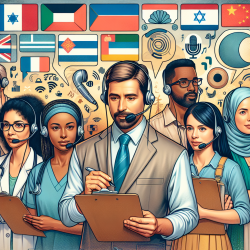The COVID-19 pandemic has revolutionized the way mental health services are delivered. As schools and therapy providers like TinyEYE pivot to online therapy, it’s crucial for practitioners to stay informed and adept at remote psychotherapy. A recent study titled "Psychotherapy by Telephone or Internet in Austria and Germany Which CBT Psychotherapists Rate It more Comparable to Face-to-Face Psychotherapy in Personal Contact and Have more Positive Actual Experiences Compared to Previous Expectations?" offers valuable insights for improving remote therapy skills.
Here are some key takeaways from the study that can help practitioners enhance their remote therapy sessions:
- Experience Matters: The study found that the more patients CBT therapists treated via telephone or internet, the more they perceived these modalities as comparable to face-to-face therapy. This suggests that gaining experience with remote therapy can improve its perceived effectiveness.
- Positive Actual Experiences: Therapists who began using remote therapy during the pandemic reported more positive experiences than they had initially expected. This indicates that initial skepticism can be overcome with practical experience.
- Knowledge is Key: Therapists who felt well-informed about legal and regulatory issues related to internet-based psychotherapy reported higher comparability with face-to-face sessions. This underscores the importance of staying updated with guidelines and best practices.
- Training and Education: The study highlights the need for incorporating remote therapy experiences into training programs. By doing so, new therapists can enter the field with a better understanding and confidence in using digital modalities.
To further improve your remote therapy skills, consider the following actions:
- Seek Out Training: Participate in webinars, online courses, and workshops focused on telehealth and remote therapy.
- Network with Peers: Join professional groups and forums where you can share experiences and learn from other therapists who are also navigating the shift to online therapy.
- Stay Informed: Regularly review updates from professional associations and regulatory bodies regarding telehealth practices.
Embracing remote therapy not only ensures continuity of care during unprecedented times but also expands access to mental health services for many who may face barriers to in-person sessions. By implementing the findings from this research, practitioners can enhance their skills and deliver effective therapy, regardless of the medium.
To read the original research paper, please follow this link: Psychotherapy by Telephone or Internet in Austria and Germany Which CBT Psychotherapists Rate It more Comparable to Face-to-Face Psychotherapy in Personal Contact and Have more Positive Actual Experiences Compared to Previous Expectations?










